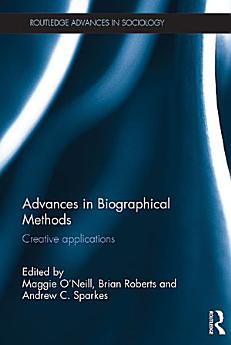Advances in Biographical Methods: Creative Applications
Maggie O'Neill · Brian Roberts · Andrew Sparkes
ডিচে ২০১৪ · Routledge
ইবুক
196
পৃষ্ঠা
family_home
যোগ্য
info
reportমূল্যাংকন আৰু পৰ্যালোচনা সত্যাপন কৰা হোৱা নাই অধিক জানক
এই ইবুকখনৰ বিষয়ে
Rooted in a long and diverse genealogy, biographical approaches have developed from a focus upon a single story, a ‘life story’ and personal documents (e.g. diaries), to encompass (more routinely) autobiographical secondary and archival research and analysis - as well as multi-media, arts based creative multi-sensory methods. Biographical Research and practices as part of human understanding helps people to make sense of what has been and what is happening in their lives, cultures, communities and societies.
Advances in Biographical Methods: Creative Applications takes up these themes: theorising, doing and applying current advances in biographical methods. It demonstrates the momentum with which they areas are developing as a field of scholarship, especially in relation to creative innovations and applications, such as in new forms of interview and other practices, and debates on its interlinking with art, performance and digital methods.
লিখকৰ বিষয়ে
Professor Maggie O’Neill is Professor in Applied Social Sciences, Durham University.
Professor Brian Roberts
is Visiting Professor in the School of Applied Social Sciences, Durham University, UK.Professor Andrew C. Sparkes
PhD is based in the Research Institute for Sport, Physical Activity and Leisure at Leeds Metropolitan University.এই ইবুকখনক মূল্যাংকন কৰক
আমাক আপোনাৰ মতামত জনাওক।
পঢ়াৰ নির্দেশাৱলী
স্মাৰ্টফ’ন আৰু টেবলেট
Android আৰু iPad/iPhoneৰ বাবে Google Play Books এপটো ইনষ্টল কৰক। ই স্বয়ংক্রিয়ভাৱে আপোনাৰ একাউণ্টৰ সৈতে ছিংক হয় আৰু আপুনি য'তে নাথাকক ত'তেই কোনো অডিঅ'বুক অনলাইন বা অফলাইনত শুনিবলৈ সুবিধা দিয়ে।
লেপটপ আৰু কম্পিউটাৰ
আপুনি কম্পিউটাৰৰ ৱেব ব্রাউজাৰ ব্যৱহাৰ কৰি Google Playত কিনা অডিঅ'বুকসমূহ শুনিব পাৰে।
ই-ৰীডাৰ আৰু অন্য ডিভাইচ
Kobo eReadersৰ দৰে ই-চিয়াঁহীৰ ডিভাইচসমূহত পঢ়িবলৈ, আপুনি এটা ফাইল ডাউনল’ড কৰি সেইটো আপোনাৰ ডিভাইচলৈ স্থানান্তৰণ কৰিব লাগিব। সমৰ্থিত ই-ৰিডাৰলৈ ফাইলটো কেনেকৈ স্থানান্তৰ কৰিব জানিবলৈ সহায় কেন্দ্ৰত থকা সবিশেষ নিৰ্দেশাৱলী চাওক।








